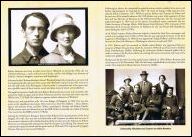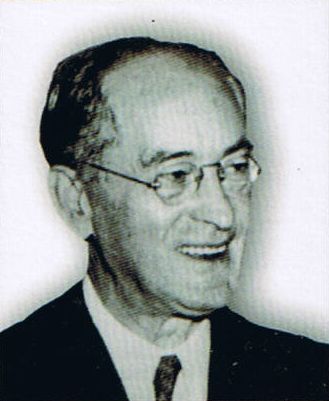
On 25th June 2016, a Memorial to Robert Brennan was unveiled in Abbey Street, Wexford. See more...

Robert Brennan had a varied public career in politics, journalism and diplomacy. He was leader of the Easter Rising in Wexford in 1916 and director of publicity for the Republican forces during the Irish Civil War, as a result of which activities he spent much time in British jails. He was the first Director General of the Irish Press and later became First Irish Minister in Washington, a post he held throughout the second world war.
After returning to Ireland he was the Director of Broadcasting for Radio Eireann until his retirement. He also published short stories, novels and plays.
Through his interest in the Gaelic Revival he became active, first in local politics and later in national politics. He helped to organize militia volunteers in Wexford and he, and his wife Una (nee Anastasia Bolger (1888-1958) were involved in the 1916 Easter Rising in Wexford which Brennan led as quartermaster of the local Brigade. Una Brennan was one of three women volunteers who climbed up and raised the tricolour over the Athenaeum in Enniscorthy. She was also the first female member of the IRB.
Robert Brennan was subsequently sentenced to death for his part in the rising. The sentence was commuted and he was imprisoned briefly in Dartmoor Prison. Following his release, he continued his political activity, which resulted in a second imprisonment in Cork Jail in 1917. In prison Brennan met Eamonn de Valera and became one of his staunchist admirers. By 1918 he was active with organizers for Sinn Fein and was director of elections in the 1918 General Election. He was arrested and imprisoned again in 1920, and, on his release, his political career continued. Following service as Irish Under-Secretary for Foreign Affairs, he became director of publicity for the Republican Forces during the Irish Civil War.
At de Valera's request, he helped to found The Irish Press and served as its general manager from 1930 to 1934, when he was appointed Secretary to the Irish Legation in Washington. In 1938 he was appointed Charge d'Affaires and in August of that year became the first Irish Minister in Washington, in which capacity he was closely involved with De Valera's successful efforts to retain Ireland's neutrality during the second world war. His account of this period is recorded in his posthumously published memoir, Ireland Standing Firm, along with his personal memoir of de Valera..
In 1947 he returned to Dublin where he became Director of Broadcasting at Radio Eireann, a position from which he retired in 1948. He and Una lived in Lower Dodder Road, Rathfarnham. Meanwhile their three daughters had stayed behind in the USA. Emer and Derry were both married with children and Maeve was making a career for herself as a writer at the New Yorker Magazine.
Following his retirement Robert Brennan shunned public life in order to return to his first love which was writing.
His publications include his autobiography Allegiance (pub 1950), an account of his involvement in the 1916 Rising and its aftermath, crime novels: The False Fingertip (pub. 1921) under his pen-name Selskar Kearney, The Man Who Walked Like a Dancer (pub.1951) and plays: The Bystander, performed in Dublin in May 1930 and again in December 1930, and Good Night Mr. O'Donnell which was performed at the Olympia Theatre in 1951 with Jimmie O'Dea in the lead role.
When Robert Brennan died in November 1964 he left several unpublished novels, plays* and other writings. In 2002, University College Dublin Press published Ireland Standing Firm, his memoirs of his wartime mission in Washington and of Eamonn de Valera.
Links to other pages:
The Enniscorthy prisoners 1916
Director of Radio Eireann - Wexford newspaper article Dec.10th 1992
Ireland Standing Firm published by UCD Press
The Republican Loan Film (1919) see: http://humphrysfamilytree.com/OMara/republican.loan.html
Links to websites
Enniscorthy in Wikipedia
Robert & Maeve Brennan papers at the University of Delaware
Steven.Vore's website
*The plays are now in the National Library of Ireland (www.nli.ie) go to Main Online Catalogue/Manuscripts.
Back to Yvonne Jerrold's links page